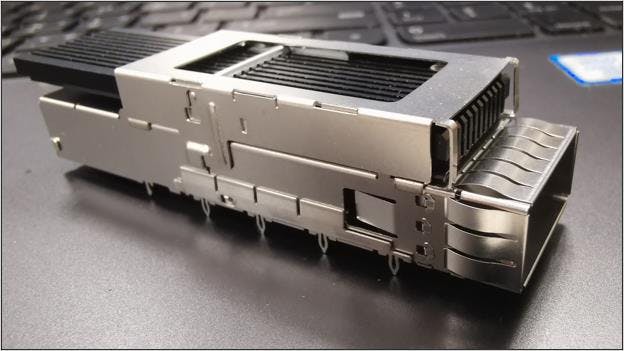Faster data rates require higher computing power with inherent thermal costs, making thermal management both critical and challenging. When each degree Celsius impacts the reliability of critical-to-function networking hardware and has a bearing on the viability of different solutions, teams must optimize designs through predictive engineering techniques.
Historically, teams used data from simple thermocouples to estimate parameters used in thermal simulations, such as the thermal contact resistance between pluggable IO and the heat sink. With the tight margins available today due to higher power modules, this approach results in inefficiency, inaccuracy and lack of repeatability.
Watch this webinar to learn about transient thermal analysis.
Gain a better picture of thermal characteristics using thermal transient testing
Accurately predict thermal contact resistance and discover a better picture of thermal characteristics using thermal transient testing and structure functions. Learn how Molex uses a test and simulation approach to provide input for calibrating their thermal simulation models to reflect the actual application with up to 99% accuracy.
Key takeaways include:
- Example of an industrial case of pluggable IO
- How to take on thermal management in newer active optical cables (AOC)
- How Molex’s drop down heatsink technology helps achieve better thermal performance
- How to thermally characterize pluggable IO components
- How to derive unknown thermal parameters and calibrate simulation models
The importance of thermal analysis for electronics design
Understanding and accurately modeling the conduction path is critical in electronics design. Limitations of traditional thermal analysis using thermocouples or infrared (IR) cameras don’t always capture thermal characteristics accurately or consistently. Because temperature directly impacts reliability, ensuring accurate measurements is critical to ensuring high reliability in electronics.
Learn about the benefits of a simulation-based approach:
- Excellent correlation, 99% correlation with POC
- Measured/scientific approach to quantify previously unmeasurable/approximated parameters
- Greater visibility of the conduction path for improved thermal root cause analysis
- Rapid debugging of quality issues to pinpoint exact trouble areas
Meet the speakers

Andras Vass-Varnai
Portfolio Development Executive for Electronics and Semiconductor
Andras Vass-Varnai obtained his MSc and PhD degrees in electrical engineering at the Budapest University of Technology and Economics. He started his professional career at the MicReD group of Mentor Graphics as an application engineer in 2007. Andras worked most for over 10 years as a product manager, supporting development projects, such as the DynTIM or the Powertester instruments. Before starting his current role as a portfolio development executive for the electronics and semiconductor market in Siemens, Andras worked out of Seoul, Korea, supporting the Asian business activities. He is working out of Chicago, IL currently, with dedicated focus on the US business growth. His main topics of interest include thermal management of electric systems, advanced applications of thermal transient testing and modeling, characterization of TIM materials and reliability testing of high-power semiconductor devices.

Joe Proulx
Application Engineer
Joe Proulx has worked with Siemens, Mentor Graphics Corporation, and Flomerics since 2005, specializing in thermal and fluid flow analysis and has over 25 years of experience as a thermal engineer in the industry. He has garnered extensive computational fluid dynamics (CFD) experience in electronics cooling analysis and more than 10+ years specializing in thermal transient test measurement for thermal characterization of semiconductors and reliability assessment. Joe has several patents-pending in package thermal modeling and validation subjects, and he contributes to IEEE and SAE conference papers for power electronics reliability and thermal simulation subjects.

Hasan Ali
New Product Development
Hasan Ali leads the development of next generation IO (112G, 224G) products for Molex with a focus on SMT & BiPass connector solutions. He supports hyperscalers, OEMs, ODMs and meeting strategic customer needs related to effectively increasing speed and capacity. Hasan’s experience includes work in supporting industry standards, strategic business and product development, and rapid adoption of new technology. Prior to his current role, Hasan was a thermal engineer serving as the lead thermal architect for 112G cage, connector, and cable solutions. He has earned multiple patents in the field of thermal design and holds a BS in Mechanical Engineering from University of Illinois at Urbana Champaign.
